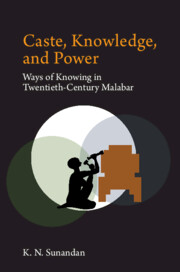Book contents
- Frontmatter
- Contents
- Acknowledgements
- Notes on Transliteration
- Introduction: Caste, Knowledge, and Power
- 1 An Ashari World of Knowing
- 2 An Ashari World of Ignoring
- 3 A Nampoothiri World of Acharam
- 4 Nampoothiris and the Order of Knowledge
- 5 Asharis and the Order of Knowledge
- Postscript: Towards an Artisanal Way of Practice of Knowing
- Bibliography
- Index
4 - Nampoothiris and the Order of Knowledge
Published online by Cambridge University Press: 11 October 2022
- Frontmatter
- Contents
- Acknowledgements
- Notes on Transliteration
- Introduction: Caste, Knowledge, and Power
- 1 An Ashari World of Knowing
- 2 An Ashari World of Ignoring
- 3 A Nampoothiri World of Acharam
- 4 Nampoothiris and the Order of Knowledge
- 5 Asharis and the Order of Knowledge
- Postscript: Towards an Artisanal Way of Practice of Knowing
- Bibliography
- Index
Summary
As mentioned in Chapter 3, by the 1920s, the Nampoothiri world of acharam faced serious challenges from both inside and outside this world. The order based on acharam became incapable of incorporating new and emerging social relations and concepts based on colonial forms of knowledge. This resulted in organized attempts in the leadership of the Yoga Kshema Sabha (YKS) to reform and to reconstitute the community based on new principles. Analysing the reform literature and scholarly debate on the Nampoothiri reform movement of the 1920s and 1930s, this chapter argues that Nampoothiris entered the order of knowledge through the reform movement, which incorporated the prominent elements of acharam that resulted in a colonial–brahmanical system of knowledge production. The chapter details the process of confrontation and mutual incorporation of these two orders and explains the elements of Nampoothiri life in the order of knowledge.
The concept of the order of knowledge explains less an ordered structure than the process where objects, human beings, and their actions were evaluated, indexed, transformed, or excluded with reference to their relation to knowledge. Knowledge attained such importance in the Nampoothiri life that even the conservatives in the community began justifying the importance of acharam based on its relation to knowledge. The order of knowledge also denotes a condition of domination in which various social forces created hierarchical series by assigning indices to objects and actions with reference to knowledge. The order of knowledge incorporated acharam into its fold by reinterpreting the ritualistic practices of Nampoothiris. Contemporary debates within the reform writers actively produced what they considered a scientific interpretation of acharam. This interpretation made some of the old practices superstitious or inhuman. The acharams in the daily life of Nampoothiris did not transform radically in this period, but acharam was no longer the reference point for these actions.
Nampoothiri reformers attempted to reorganize their jati, where acharam was the central organizing force, into samudayam (community) in which knowledge was the pivotal point around which new social relations were imagined. These attempts introduced a process of engendering individuals in which each man and woman required knowledge to be a member of the reformed community.
- Type
- Chapter
- Information
- Caste, Knowledge, and PowerWays of Knowing in Twentieth Century Malabar, pp. 126 - 159Publisher: Cambridge University PressPrint publication year: 2023



